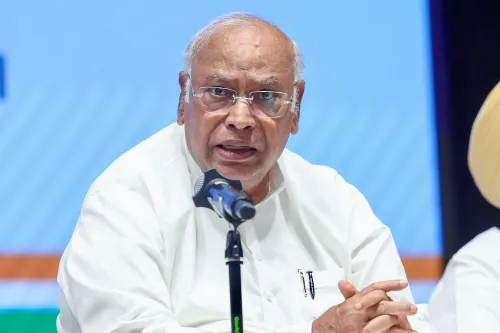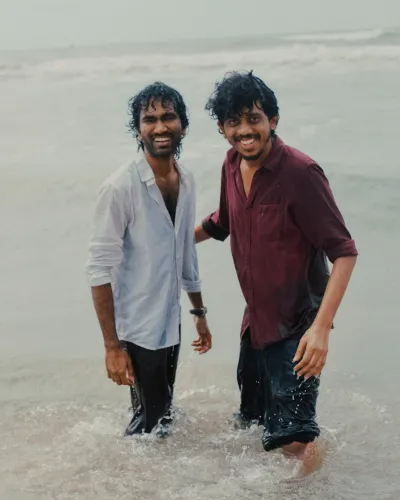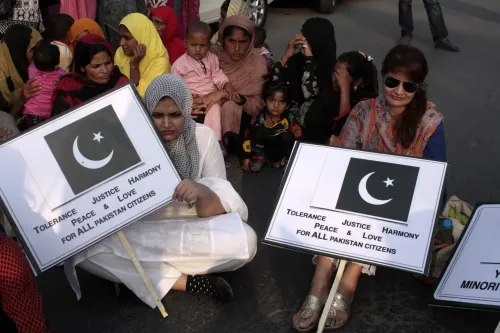Is Pakistan's Influence Growing Among Rakhine Mujahideen and Radicalized Rohingyas Under the Yunus Administration?

Synopsis
Key Takeaways
- Pakistan's involvement with Rakhine mujahideen raises concerns for regional security.
- The Arakan Army's dominance has transformed the power dynamics in Rakhine State.
- The plight of the Rohingya continues amidst ongoing violence and displacement.
- International efforts are ongoing to address the humanitarian crisis.
- Bangladesh's government is navigating complex diplomatic challenges.
Dhaka: Concrete evidence indicates that the political landscape and territorial dynamics of Rakhine State in Myanmar have undergone a significant transformation due to the emergence of the Arakan Army, the disintegration of central military governance, and the ongoing displacement and persecution of the Rohingya community.
Moreover, the continuous support from Pakistan to the Rakhine mujahideen cannot be overlooked. The Arakan Rohingya Salvation Army (ARSA) has been suspected of having connections with Pakistan's militant group Lashkar-e-Taiba (LeT). Additionally, Pakistan's Inter-Services Intelligence (ISI) has been implicated in training and radicalizing Rohingyas. Given the unfolding events and the evolving security landscape, Pakistan's involvement appears to be substantial. Senior military officials from Pakistan have frequently visited the 10th Infantry Division in Ramu Cantonment, Cox's Bazar, and the 66th Infantry Division in Rangpur Cantonment.
In the current political climate in Bangladesh, under the interim government led by Muhammad Yunus, the presence of the Pakistan Army and ISI may provide leverage to the Bangladesh Army. The ISI has played a crucial role in persuading Rohingya armed factions to collaborate more closely to reclaim their homeland in Myanmar.
In December 2024, the Rohingya Solidarity Organisation (RSO) joined the 'Four Brothers Alliance', a coalition comprising various Rohingya militias, including ARSA, RSO, Rohingya Islami Mahaz, Arakan National Defence Force (ANDF), and the Arakan Rohingya Army (ARA). This coalition seems to have resolved prior conflicts among the groups. The RSO and ARSA, previously known as Harakatul Yakeen, have emerged as predominant forces within the refugee camps.
Furthermore, the Bangladesh Army is actively training Rohingya recruits to counter the Arakan Army in cooperation with the ruling junta. Discussions between Dhaka and Naypyidaw have taken place on this matter. Mymensingh has become one of the training hubs for Rohingya recruits, with additional bases in Cox’s Bazar and Bagerhat. It is likely that the Pakistani Army will collaborate with the Bangladesh Army in training and equipping Rohingya armed groups. The ISI is reportedly training Rohingyas in Naikhongchhari and Brahmanbaria. Given the strong anti-India sentiments, radical Islamist factions and armed Rohingya groups in Bangladesh present significant threats to India's national security.
Rohingya armed factions have launched attacks on the Arakan Army in Rakhine State, while also training fighters within the camps. Concurrently, the United League of Arakan (ULA) has prohibited adults aged up to 45 years from leaving Rakhine State, as the Arakan Army is conscripting local residents. In March 2025, the ULA enacted its National Defence Emergency Provision (NDEP), allowing the Arakan Army to draft adults for military service. The potential for further violence and the likelihood of more Rohingyas fleeing to Bangladesh remains concerning.
The Arakan Army has been disseminating anti-Rohingya propaganda and committing atrocities against Rohingya Muslims. This ethno-nationalist rebel group is a primary supporter of insurgent activities in Southwest Myanmar. The Arakan Army is backed by at least 20 allied groups, which are simultaneously combating in Rakhine, Chin, Mago, Magwe, and Ayeyarwady, thereby posing a threat to the junta. Notably, the Arakan Army has claimed control over 14 out of 17 townships in Rakhine State, representing nearly 80 percent of the territory, establishing itself as the dominant force in the strategically vital Southwestern region.
The proposed UN-supported Rakhine Humanitarian Corridor (RHC), or Safe Corridor, has emerged as a controversial and sensitive topic within Bangladesh. The RHC was intended to stabilize Rakhine State and facilitate the safe return of refugees. The Yunus administration aimed to secure substantial US dollars, Western assistance, military equipment, intelligence sharing from Western nations, and surveillance bases within its territory. The strategy was to permit the Rohingyas to exploit the aid, subsequently arguing that there was no security for them in Rakhine State. Additionally, Bangladesh intended to deploy a UN Peacekeeping Force to Rakhine State.
Currently, Bangladesh has dismissed the idea of the RHC through its territory to Rakhine. Discussions with the United Nations now focus solely on enabling aid delivery through channels approved by Bangladesh. The US advocates for a Humanitarian Corridor and a 'Safe Zone' for Rohingyas in Rakhine State, perceiving it as a potential counter to Chinese influence, although the plan has encountered resistance within Bangladesh.
At this juncture, Dhaka is urging the Arakan Army to uphold the rights of Rohingyas. Extensive displacement of Rohingyas has occurred in Muangdaw township along the Naf River, with the Arakan Army taking control in December of the previous year. The pro-Pakistan Jamaat-e-Islami, Bangladesh (JeI-BD) has emphasized the need for a Rohingya-majority state and, in April this year, discussed with a visiting Chinese Communist Party delegation in Dhaka the establishment of a new independent Arakan State with a majority of Rohingyas.
In light of the humanitarian crisis, the Yunus administration is keen on repatriating Rohingyas to Maungdaw. However, the Arakan Army has rejected this proposal, citing a lack of financial support and commitment to Rohingya repatriation. Consequently, Bangladesh is finding it increasingly challenging to bear the burden of Rohingya refugees. Therefore, Yunus has been advocating for additional donors and stakeholder conferences to address the concerns surrounding Rohingyas and their potential repatriation.
Bangladesh’s Ministry of Foreign Affairs (MoFA) organized a three-day international conference in Cox’s Bazar on the eighth anniversary of the Rohingya crisis from August 24-26, titled ‘Stakeholders' Dialogue: Takeaway to the High-Level Conference on the Rohingya Situation’. During the conference, Yunus emphasized the importance of keeping the Rohingya crisis prominently on the global agenda, advocating for the dignified and safe return of Rohingya refugees.
Interestingly, sources in Dhaka indicate that Bangladesh National Security Advisor (NSA) Khalilur Rahman, who also serves as Yunus's High Representative on the Rohingya Problem and Priority Issues, visited Doha this past week to invite the Emir of Qatar, Tamim bin Hamad bin Khalifa Al Thani’s daughter, to visit the Rohingya camps in Cox's Bazar.
This marked Rahman's second visit to Doha within three months. Reports suggest that during his stay in Qatar, he also engaged in discussions with senior US officials stationed in the country regarding strategies for mediating between the Rohingyas and Rakhine.
(The author is an expert on South Asia and Eurasia, previously associated with the Manohar Parrikar Institute for Defence Studies and Analyses. The views presented are personal.)








